When writing a children’s story, or any story for that matter, the author gets into a certain momentum: a work flow or groove.
You, the writer, becomes absorbed in your writing.
There are times when the story just flows, and you can increase your pace. Then, other times, you may struggle with the story, causing it to take more time. In this case, the work pace most likely slows down.
But when writing your own stories you can go at your own pace. You’re in control.
If you’re a ghostwriter, though, you don’t have the ‘time’ luxury. You can’t go at your own pace because of project time limits. And sometimes, the client throws a monkey wrench into your work schedule. I’ve had a few clients who took long pauses in their projects.
Interestingly, none of these projects had anything to do with payment issues because, in each case, the projects were up to date.
In my experience, client pauses happen for various reasons, such as sickness, life, or work.
No matter what the reasons, when a client takes a long pause, it can create at least two problems for the children’s ghostwriter.
- You lose your writing momentum.
As mentioned above, when your momentum is interrupted, you lose it. The rhythm, the flow is gone.
And depending on how long the pause lasts, that momentum can need serious revival when the project moves forward again.
What this means is when the project is picked up again, you need to become reacquainted with the story. Depending on how complicated the story is, the longer it will take to get up to speed.
A few years ago, I worked on an edit/rewrite of a very complicated young adult story over 100,000 words. The author took a long pause, revising the latter part of the story before sending it back to me. The pause was about two months.
The project started again and I had to reacquaint myself with the story in order to build up the momentum again.
When pauses like this happen, it adds more time and work to the project. Time and work that wasn’t accounted for.
Another aspect of losing momentum is the story itself.
If I’m in that flow and it’s stopped, will I have the same train of thought I had before? Will I be as enthusiastic? Will I find that ‘groove’ again and tell the best story possible?
So far, I’ve been able to pick up where I left off after a thorough review of the entire draft. But I can see how the story could be affected. Long pauses aren’t a good thing.
- The writer’s workload can be challenged.
As a working children’s ghostwriter, you get new projects that must to be scheduled to your workload.
When a client pauses a project and then picks it up in a month or two, you’re already into those other projects. You’ve developed a momentum for each of them.
If you only have one or two other projects in the works, adding the paused project back into your schedule is not too difficult.
But if you’re working on four or five projects, and one is a middle grade or young adult, being able to juggle a paused project back into the mix can be challenging.
You don’t want to take time and attention away from current projects.
So, what’s the ghostwriter to do?
The answer to this question depends on the writer.
I always work the paused project back into my workload. I keep my current projects in the forefront, though.
Fortunately, long pauses on projects don’t happen to me often, especially very long ones. However, in 2020, I had three projects paused. It could be due to that year’s particular circumstances, or possibly it was a coincidence.
Whatever the reason, because of experience with ‘pausing’ occurrences, I now have a clause in my freelance agreement that allows for a fee to resume a project after a two-week pause. I do, of course, take into consideration the circumstances involved.
So, if you’re working with a ghostwriter, be aware that there is a writing momentum. And it’s important to keep that momentum going for the story and for the ghostwriter’s time and workload.
Dialogue and Tags – It Can Be Tricky
Writing Skills Vs Talent
Believe in Yourself as a Writer

I’m a working children’s ghostwriter, rewriter, editor, and coach. I can help turn your story into a book you’ll be proud to be the author of, one that’s publishable and marketable.
OTHER HELP I OFFER:
HOW TO WRITE A CHILDREN’S FICTION BOOK
A DIY book to help you write your own children’s book.
PICTURE BOOK, CHAPTER BOOK, MIDDLE GRADE COACHING
Four to twelve-week coaching programs.
WRITERS ON THE MOVE SELF-PUBLISHING SERVICE
Specializing in children’s picture books.
You can contact me at: kcioffiventrice@gmail.com. Or give me a call at 347—834—6700. (Please leave a message- I’ll get back to you as soon as I can.)


